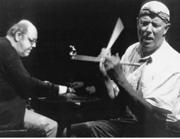For a moment, consider DIY in its non-musical, Bob Villa incarnation. The year is 1979. Amsterdam. The rallying cry among progressive youths—same as today, same as Seattle—is the need for affordable housing. The Dutch government, attempting to appease an ever-growing population of restless left-wing vandals and activists, goes on the offensive. Rather than arrest (or, even worse, ignore) the burgeoning squatters’ rights movement, it takes the Habitat for Humanity route: Anyone willing to build his own house can, lumber and tools provided for free, along with plans and government land. The Makita Tool Co., then in its infancy, plays a pivotal role (donations!). And what better way to promote a new line of drills and bits than have every industrious Dutch youth equipped with one?
To the politicians’ chagrin, Amsterdam is largely untouched; Halfweg, Osdorp, and the outlying townships see the bulk of the homebody influx. Eventually, of course, the program crumbles. The shanties don’t last long, from the get-go arguments arise over land rights, and everybody decides they love the city. So the punks return, bringing their attitudes, graffiti, and leather jackets with them. No change. Strange thing, though: Those Makita drills are still out there (you stumble upon them in Dutch flea markets). Painted an unmistakable bright red (the company has since switched to teal blue) most of them still work, boasting as much torque as ever. Over the decades, a whole line of compatible accessories and bits has made them even more versatile—everything about them is interchangeable and rugged.
Truth be told, none of this ever happened. But with story fresh in mind and needing a conclusion, consider the Ex—Amsterdam’s original five-piece anarchist punk band—as the Makita drill of rock. With a simple design and the flexibility of a contortionist, it’s outlasted peers, championed social consciousness, accessorized with improv-jazz greats, created records that double as “art,” and, oh yes, kept more than a dozen amazing self-released albums in print. Built tough, it’s still going. You can spray paint its name in two seconds flat. And 1999 marks the Ex’s 20th year of creating music with a message.
Give a listen to last year’s Steve Albini produced Starters Alternators album on Touch & Go. The trademark Ex elements—the drill-sergeant-meetsMark E. Smith staccato lyricism of vocalist Jos (G.W. Sok), the pummeling beats of percussionist/vocalist Katrin, and the volatile sound of badly tuned guitars gone wild—are still there. But under Albini’s perfectionist knob twisting, the group has never sounded better. Political rhapsodizing, a work song from Zimbabwe, and—a true Ex rarity—a love song (“Bee Coz”) all find their intense way onto record. The Ex has been mixing this musical stew for decades, and now it’s nearly perfect.
“Even though the Ex is perceived as a punk-rock band, that was 20 years ago,” guitarist Andy says. “People in the Ex might still have the attitude of punk, but they’re not punk rockers—none of them really listen to punk music anymore. We hardly play what I would consider punk rock, even though it has a sort of similar energy. It’s not strange that we also listen to jazz, improvised music, and a lot of music from all over the world. So, by the fact that we listen to all that stuff, sometimes we get inspired when we hear one, and we think, ‘We could try to do our own version of that.’ It seems completely normal to us.”
Of course, nothing they do is completely normal. Sandwiched between Fugazi and Sleater-Kinney at Seattle’s DV8 a few weeks back, the Dutch did things their Yank colleagues could never get away with: they covered a Stephen Crane poem; engaged in an onstage towel fight; improvised; even laughed.
Early Ex newsletters (slipped into LPs with various political flyers) talked about the need for public transport and squatters’ rights; now they might plug the Ethiopiques collection of African-music reissues or say farewell to Tom Cora, the late avant cellist the Ex collaborated with on a pair of albums. In ’86, the band released 1936, a stunning book of images from the Spanish Revolution, paired with two singles of Spanish folksongs; nearly a decade later, it covered “House Carpenter” by Clarence Ashley. Everything has a message, for sure, but now it’s global and mature.
“In the old days, it was much more black-and-white, and quite direct and quite literally political and saying, ‘This is the way it is,'” Andy explains. “I guess as you get older, you realize that there are other shades and other ways of looking at things.”
The Ex’s future sees a collaboration with Tortoise (CD due in May), a May 29 anniversary (platinum, if you wish to send gifts) show with still-undisclosed special guests in Amsterdam (think: Dutch jazz greats and select indie rockers), and the recording of a “folk” album the band’s still coming to grips with. “It’s a bit of an unfortunate name ’cause it gives too many connotations,” Andy notes. “We’re working on a record where we choose songs that we really like from different cultures—there’s a Kenyan song, there’s an Ethiopian song, and we’re trying to make our own versions of them.”
Which begs the question: Fresh off a West Coast tour, are there any bits of our culture these world travelers would feel compelled to sing about?
“There are a lot of things to talk about in America, really. It’s a real cultural imperial country. It’s really spreading itself everywhere. And culturally, it’s wiping out little groups all over the world, who are abandoning their own traditions to go for the American way,” Andy says. He waits a second, then ponders the obvious, “This might be a theme for the next record: America.”






